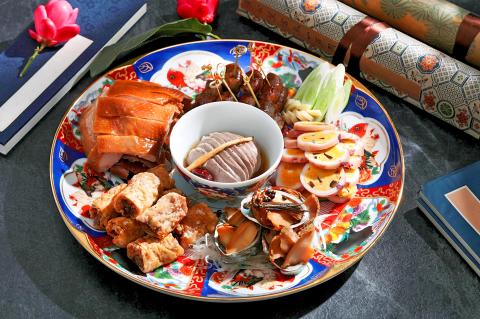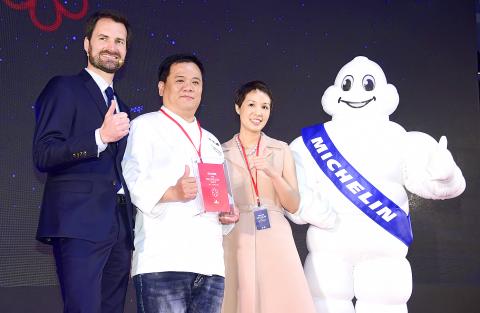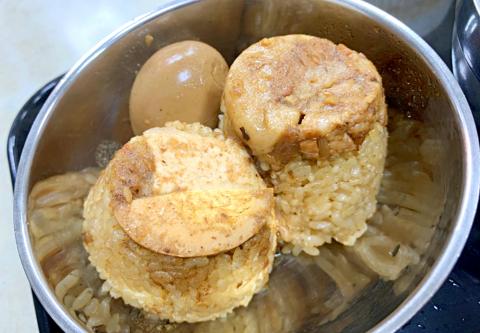The French Michelin Guide yesterday awarded stars to 24 establishments in its second restaurant guide to Taipei.
“Our inspectors were not only impressed by the standard of local Taiwanese cuisine, but also by the global influences being imported by the very talented and innovative local chefs, which together will no doubt entice food lovers from around the world,” said Gwendal Poullennec, International Director of the Michelin Guides.
Establishments like Tairroir (態芮) and Raw, prominent names that each received a star last year for thoughtful modern treatments of Taiwanese ingredients, embody that attitude. Both restaurants rose to earn two stars in this year’s guide.

Photo: Ling Mei-hsueh, Taipei Times
The name Tairroir — a portmanteau of “Taiwan” and “terroir” — is an artist’s statement by chef Kai Ho (何順凱). Speaking after the ceremony yesterday morning, Ho said that his intention went beyond using indigenous ingredients, to give diners an immersive experience in Taiwanese culture and history.
Raw, opened by renowned chef Andre Chiang (江振誠) in 2014, is already one of the city’s most in-demand reservations. Chiang’s decision to shutter his eponymous two-star restaurant in Singapore last year and return to train a new generation of Taiwanese chefs was regarded as a boon for the country’s culinary scene.
Chef Alain Huang (黃以倫) said that Raw, which treats local ingredients with French techniques, had taken the last year to embark on “deeper research” into Taiwanese produce and culture. But the win still came as a surprise.

Photo courtesy of Taiwan Michelin
Also among the new one-star recipients is Mountain and Sea House (山海樓), which serves meticulously-researched banquet-style dishes honoring Taiwan’s culinary heritage. Chef Tsai Jui-lang (蔡瑞郎) acknowledged the hard work of colleagues who scour the island in search of native species of ingredients, allowing his kitchen to revive authentic versions of Taiwanese dishes from early 20th-century recipe archives.
Two young restaurants that opened just last year also received one star each at yesterday’s ceremony — Logy, which Hokkaido-born chef Ryogo Tahara said aspires to bring French and Italian inflections to Asian cuisine; and Impromptu by Paul Lee, which offers casual fine-dining for an international palate.
One new entrant immediately received two stars on its first outing with the Michelin Guide. Sushi Amamoto is a 12-seat sushi bar offering a 20-course chef’s choice menu, with seasonal fish flown in from Kyushu and Tokyo.

Photo: Chou Tsai-wei, Taipei Times
Cantonese restaurant Le Palais (頤宮) at the Palais de Chine Hotel remains Taipei’s only three-star Michelin establishment.
Reactions by recipients ranged from delight to near nonchalance, with many admitting that they could not take the day off to celebrate as they had full houses of reservations to honor.
“The pressure starts tomorrow,” Ho said, acknowleding the high scrutiny and expectations that Michelin honorees receive.
STREET FOOD CAPITAL
Earlier, Michelin also named 58 eateries, including 25 new entrants, in its more affordable Bib Gourmand selection. To qualify for the Bib Gourmand, an eatery must offer a three-course meal not exceeding NT$1,000 (roughly US$32).
Gongguan (公館), Yansan (延三) and Huaxi Street (華西街) night markets made their debut on the list, which already recognizes Shilin (士林), Ningxia (寧夏), Raohe (饒河), Nanjichang (南機場) and Linjiang (臨江) night markets.
Yansan landed a whopping three recommendations on its first appearance, owing to the market’s delectable cabbage rice and pork rib soup, savory tube rice cakes and glutinous rice meat dumplings.
Like other Asian capitals with rich street food cultures, the Bib Gourmand selection lends a sheen of glamor to Taipei natives’ humble favorites like scallion pancake, stinky tofu and guabao (割包) — flat steamed buns stuffed with braised pork — and will be an indispensable guide for globe-trotting foodies.

Jacques Poissant’s suffering stopped the day he asked his daughter if it would be “cowardly to ask to be helped to die.” The retired Canadian insurance adviser was 93, and “was wasting away” after a long battle with prostate cancer. “He no longer had any zest for life,” Josee Poissant said. Last year her mother made the same choice at 96 when she realized she would not be getting out of hospital. She died surrounded by her children and their partners listening to the music she loved. “She was at peace. She sang until she went to sleep.” Josee Poissant remembers it as a beautiful

Before the last section of the round-the-island railway was electrified, one old blue train still chugged back and forth between Pingtung County’s Fangliao (枋寮) and Taitung (台東) stations once a day. It was so slow, was so hot (it had no air conditioning) and covered such a short distance, that the low fare still failed to attract many riders. This relic of the past was finally retired when the South Link Line was fully electrified on Dec. 23, 2020. A wave of nostalgia surrounded the termination of the Ordinary Train service, as these train carriages had been in use for decades

Lori Sepich smoked for years and sometimes skipped taking her blood pressure medicine. But she never thought she’d have a heart attack. The possibility “just wasn’t registering with me,” said the 64-year-old from Memphis, Tennessee, who suffered two of them 13 years apart. She’s far from alone. More than 60 million women in the US live with cardiovascular disease, which includes heart disease as well as stroke, heart failure and atrial fibrillation. And despite the myth that heart attacks mostly strike men, women are vulnerable too. Overall in the US, 1 in 5 women dies of cardiovascular disease each year, 37,000 of them

Politically charged thriller One Battle After Another won six prizes, including best picture, at the British Academy Film Awards on Sunday, building momentum ahead of Hollywood’s Academy Awards next month. Blues-steeped vampire epic Sinners and gothic horror story Frankenstein won three awards each, while Shakespearean family tragedy Hamnet won two including best British film. One Battle After Another, Paul Thomas Anderson’s explosive film about a group of revolutionaries in chaotic conflict with the state, won awards for directing, adapted screenplay, cinematography and editing, as well as for Sean Penn’s supporting performance as an obsessed military officer. “This is very overwhelming and wonderful,” Anderson